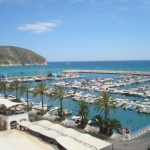Nestled on the southeastern coast of Spain, in the heart of the Costa Blanca, lies the enchanting town of Moraira. This small, yet vibrant, locale has a rich tapestry of history that stretches back through the ages, from its early days under Moorish rule to its current status as a coveted destination for tourists seeking a blend of historical charm and modern luxury. This article delves into Moraira's captivating journey, exploring the transformation of this humble fishing village into a beacon of Mediterranean allure.
The Moorish Era: Foundations in a Turbulent Age
The origins of Moraira are steeped in the mists of the early medieval period, a time when the Iberian Peninsula was a mosaic of Christian and Muslim territories. The Moors, who arrived in Spain in the early 8th century, brought with them advanced agricultural practices, architectural styles, and a rich cultural heritage. They established small settlements and watchtowers along the coast, primarily as a means of defense against invaders from the sea. These watchtowers, some of which still stand today, are the earliest markers of Moraira's historical significance.
One such tower, the Castillo de Moraira, is a testament to this era. Built in the 16th century on the foundations of an older Moorish structure, the castle was a strategic fortification against the frequent pirate attacks that plagued the Mediterranean coast. Though now a symbol of the town's ancient past, the Castillo de Moraira's robust walls and commanding presence continue to dominate the town's skyline, serving as a tangible link to its Moorish roots.
The Agricultural Epoch: Fruits of the Land and Sea
Following the Reconquista, the period in which the Christian kingdoms of northern Spain gradually reconquered the peninsula from the Moors, Moraira began to transform. The town shifted from being a strategic military outpost to focusing on agriculture and fishing. The fertile soil and mild climate of the region proved ideal for growing a variety of crops, most notably grapes, almonds, and olives. Vineyards and orchards sprawled across the countryside, shaping the landscape and the lives of the inhabitants.
Fishing, too, became a cornerstone of Moraira's economy. The Mediterranean Sea, with its abundance of fish and seafood, provided a vital source of sustenance and livelihood for the local population. The daily catch was, and still is, a staple of the regional cuisine, celebrated in local dishes that combine the fresh flavors of the sea with the agricultural produce of the land.
The 20th Century: Winds of Change
The 20th century brought significant changes to Moraira, as it did to much of the world. The Spanish Civil War (1936-1939) and the subsequent dictatorship under General Francisco Franco had a profound impact on the entire country, including this small coastal town. However, it was in the post-war era, particularly from the 1960s onwards, that Moraira began to witness a transformation that would redefine its identity.
Tourism emerged as a new driving force in the local economy, spurred by Spain's growing popularity as a holiday destination for northern Europeans. Moraira, with its idyllic beaches, pristine waters, and pleasant climate, quickly became a magnet for visitors seeking a tranquil escape from the hustle and bustle of urban life. The town began to develop rapidly, with the construction of hotels, villas, and other tourist amenities. However, unlike many of its neighboring towns, Moraira took a measured approach to development, striving to preserve its natural beauty and historic charm.
Preserving the Past, Embracing the Future
Today, Moraira stands as a unique blend of history and modernity. The town has managed to retain much of its traditional character, with its narrow, winding streets, whitewashed buildings, and vibrant markets. At the same time, it offers all the comforts and conveniences of a modern tourist destination, with a wide array of restaurants, bars, shops, and leisure activities.
The local government and community have been instrumental in this balancing act. There has been a conscious effort to protect Moraira's historical sites, such as the Moorish towers and the Castillo de Moraira, while also promoting sustainable tourism practices that respect the natural environment. The town's marina, with its sleek yachts and boats, symbolizes this synergy, blending the age-old maritime heritage with contemporary luxury and style.
A Cultural Melting Pot
Moraira's evolution into a cosmopolitan tourist haven has also turned it into a cultural melting pot. The influx of visitors and expatriates from different parts of the world has enriched the town with a diverse tapestry of cultures, languages, and traditions. This multicultural aspect is celebrated in various festivals and events throughout the year, bringing together locals and visitors in a vibrant display of unity and joy.
The Rise of Modern Tourism
The 1960s marked the beginning of a tourism boom in Moraira. The town underwent a transformation as new infrastructure was developed to accommodate the influx of visitors. Hotels, restaurants, and tourist shops began to spring up, complementing the town's existing charm with modern amenities.
Unlike some of its neighboring towns, Moraira took a cautious approach to development. Strict building regulations were put in place to preserve the town's historic character and natural beauty. This careful planning helped Moraira retain its charm and appeal as a high-quality, low-density tourist destination.
Today, Moraira is renowned for its beautiful beaches, such as Playa de l'Ampolla and Playa del Portet, its bustling marina, and its vibrant culinary scene, which blends traditional Spanish flavors with international influences. The town's historical sites, like the Castillo de Moraira and the Church of Santa Catalina, provide a glimpse into its rich past.
Cultural Legacy and Future Prospects
Moraira's history is not just a story of buildings and economies; it's a narrative of the people who have shaped and been shaped by this land. The town's cultural events, like the Moors and Christians festival, celebrate its diverse historical influences, while local markets and festivals showcase the rich tapestry of its community life.
As Moraira looks to the future, it faces the challenge of balancing the demands of modern tourism with the preservation of its historical and natural heritage. The town's commitment to sustainable development, its celebration of cultural heritage, and its continued appeal as a high-quality tourist destination suggest a bright future.
Conclusion
Moraira's journey from Moorish towers to modern tourism is a microcosm of the broader historical currents that have shaped Spain's Mediterranean coast. It's a tale of adaptation and resilience, of a community that has navigated the waves of history while retaining its unique charm and identity. For visitors and residents alike, Moraira offers not just a place to relax and enjoy the Mediterranean lifestyle but also a chance to connect with a rich and vibrant history that continues to shape the town's character.
Frequently Asked Questions (FAQs)
What historical significance do the Moorish towers in Moraira hold?
The Moorish towers in Moraira, such as the Castillo de Moraira, were initially built for defense against invaders and pirates during the Moorish era and are crucial historical landmarks representing the town's ancient past
How did Moraira transform after the Reconquista?
After the Reconquista, Moraira shifted its focus from being a military outpost to agriculture and fishing, leveraging its fertile land and abundant sea for economic growth and sustenance
What impact did the 20th century have on Moraira?
The 20th century, especially post-1960s, marked a significant transformation in Moraira with the emergence of tourism as a major economic driver, leading to rapid development while maintaining its historical charm
How has Moraira managed to balance modern development with historical preservation?
Moraira has successfully balanced modern development and historical preservation through measured urban planning, protecting historical sites, and promoting sustainable tourism practices
What makes Moraira a unique tourist destination today?
Moraira's unique appeal lies in its blend of rich historical heritage, preserved natural beauty, modern amenities, and its status as a cultural melting pot, offering a harmonious mix of tradition and modernity



